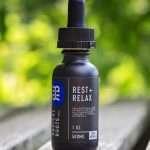
Depression is a significant public health issue that affects millions of people worldwide. Characterized by persistent feelings of sadness, disinterest, and a lack of energy, it can severely affect an individual’s quality of life.
In addition to psychotherapy and pharmacological treatments, certain nutritional supplements are being recognized for their potential benefits. This article focuses on St. John’s Wort, Saffron, SAMe (S-adenosylmethionine), and Omega-3 fatty acids as supplementary support.
1. St. John’s Wort
St. John’s Wort has a long history of use in traditional medicine for mood disorders. Several clinical trials suggest that it may be effective for mild to moderate depression1. However, it’s essential to note that St. John’s Wort can interact with certain medications, including antidepressants, so consultation with a healthcare professional is vital.
Rest + Relax Tincture
This is the perfect daily tonic to help create that mental “space” we all need. Calm the noise around you and take a breath as you power through the day.
2. Saffron
Saffron, derived from the flower of Crocus sativus, is being researched for its potential antidepressant properties. Some studies indicate it may have a positive effect on mood regulation2. More research is needed, but early findings are promising.
3. SAMe (S-adenosylmethionine)
SAMe is a compound found naturally in the body and is involved in the production and breakdown of important neurotransmitters like serotonin and dopamine. Some research suggests that SAMe supplementation may be effective in managing depression symptoms, especially in individuals who don’t respond to standard treatments3.
4. Omega-3 Fatty Acids
Omega-3 fatty acids, particularly EPA and DHA, are essential for brain health and function. Some studies suggest that individuals with depression may have lower levels of these fatty acids. Supplementation with omega-3s may help manage depressive symptoms by improving brain function and reducing inflammation4.
Conclusion
Depression is a complex condition that often requires a multifaceted treatment approach. Alongside traditional treatments like medication and psychotherapy, supplements such as St. John’s Wort, Saffron, SAMe, and Omega-3 fatty acids may provide supportive help. However, always consult with a healthcare professional before starting any new supplement regimen.
References
Remember, while these supplements show potential in managing depression, they should not be used as a replacement for medical advice or treatment. Always consult with a healthcare professional before starting any new supplement regimen.
Footnotes
- Linde, K., Berner, M., & Kriston, L. (2008). St John’s wort for major depression. Cochrane Database of Systematic Reviews, (4). ↩
- Hausenblas, H. A., Saha, D., Dubyak, P. J., & Anton, S. D. (2013). Saffron (Crocus sativus L.) and major depressive disorder: a meta-analysis of randomized clinical trials. Journal of integrative medicine, 11(6), 377-383. ↩
- Papakostas, G. I., Mischoulon, D., Shyu, I., Alpert, J. E., & Fava, M. (2010). S-adenosyl methionine (SAMe) augmentation of serotonin reuptake inhibitors for antidepressant nonresponders with major depressive disorder: a double-blind, randomized clinical trial. American Journal of Psychiatry, 167(8), 942-948. ↩
- Grosso, G., Pajak, A., Marventano, S., Castellano, S., Galvano, F., Bucolo, C., … & Caraci, F. (2014). Role of omega-3 fatty acids in the treatment of depressive disorders: a comprehensive meta-analysis of randomized clinical trials. PloS one, 9(5), e96905. ↩






